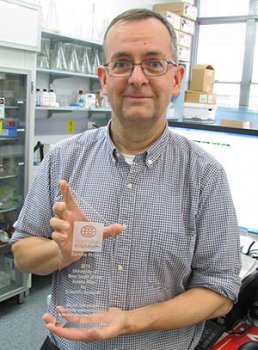A discovery that could lead to new treatments or vaccines for conditions as diverse as tuberculosis and thrush has earned Melbourne researchers the 2013 Eureka Prize for Scientific Research.
 Researchers from The University of Melbourne and Monash University used synchrotron x-ray diffraction techniques on the MX beamlines at the Australian Synchrotron, along with other laboratory techniques to discover the function of a group of ‘mystery’ immune cells mainly found in the human gut. These cells appear to be part of our first line of immune defence, detecting and responding to vitamin B by-products associated with biosynthetic pathways typically only found in bacteria and yeast.
Researchers from The University of Melbourne and Monash University used synchrotron x-ray diffraction techniques on the MX beamlines at the Australian Synchrotron, along with other laboratory techniques to discover the function of a group of ‘mystery’ immune cells mainly found in the human gut. These cells appear to be part of our first line of immune defence, detecting and responding to vitamin B by-products associated with biosynthetic pathways typically only found in bacteria and yeast.
The discovery opens up potential new paths for future drug design, especially for drugs that target invasive bacteria and yeast.
Photo at right: Dr Lars Kjer-Nielsen (Monash) holding the commemorative plaque he received as a recipient of the Eureka prize with Prof. Jamie Rossjohn (Monash) and Prof. James McCluskey (Melbourne)


Prof. Jamie Rossjohn Prof. James McCluskey
Eureka Prize official media release
Recognition of vitamin B metabolites by mucosal-associated invariant T cells, Nature Communications 4, Article number 2142 (11 July 2013), Onisha Patel et al.
MR1 presents microbial vitamin B metabolites to MAIT cells, Nature 491, 717–723 (29 November 2012), Lars Kjer-Nielsen et al.
Monash University media release
University of Melbourne news story
